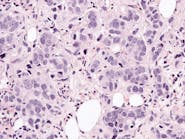Older people who have higher levels of triglycerides, a type of fat, may have a lower risk of dementia and a slower cognitive decline over time compared to people who have lower levels, according to new research published in the October 25, 2023, online issue of Neurology, the medical journal of the American Academy of Neurology. While the study found a link, it does not prove that higher levels of triglycerides prevent dementia.
Researchers used healthcare data to identify 18,294 people in one cohort with an average age of 75 who did not have a prior diagnosis of Alzheimer’s disease or dementia.
Participants were followed for an average of six years. During that time, 823 people developed dementia.
Researchers looked at participants’ measurements of total cholesterol, triglycerides, low-density lipoprotein cholesterol (LDL) and high-density lipoprotein cholesterol (HDL) each year of the study.
Then researchers divided participants into four groups based on fasting triglyceride levels. Of the total group, average triglycerides were 106 milligrams per deciliter (mg/dL). For adults, a normal or healthy triglyceride level is below 150 mg/dL.
After adjusting for variables that could affect risk of dementia including education and cholesterol-lowering treatments, researchers found every doubling of triglyceride levels was associated with an 18% lower risk of developing dementia.
The lowest triglyceride group had levels of less than 62 mg/dL. The second group had levels of 63 to 106 mg/dL. Compared to the lowest group, the second group was 15% less likely to develop dementia. The third group had levels of 107 to 186 mg/dL. Compared to the lowest group, they were 24% less likely to develop dementia. The fourth group had levels of 187 mg/dL or higher. Compared to the lowest group, they were 36% less likely to develop dementia.
Of the 1,416 people in the lowest triglyceride group, 82 people, or 6%, developed dementia. Of the 7,449 people in the second group, 358 people, or 5%, developed dementia. Of the 7,312 people in the third group, 310, or 4%, developed dementia. Of the 2,117 people in the fourth group, 73 people, or 3%, developed dementia.
The researchers also validated their results in another dataset comprised of 68,200 older people from the U.K. Among them, 2,778 people developed dementia over an average time of 12 years. They observed a consistent result which shows a 17% decreased risk of dementia with every doubling of triglycerides levels.
Researchers also found that higher triglycerides were also associated with slower decline in composite cognition, a combined result from tests of global function, psychomotor speed, language and executive function and memory over time.





